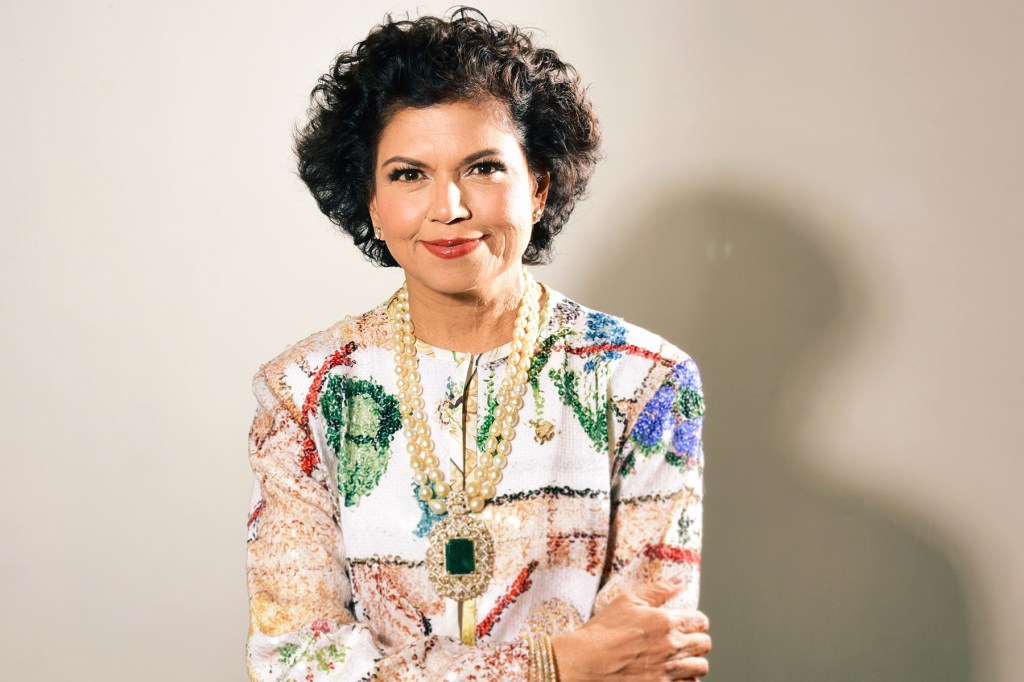Earlier this year, at the age of 70, Chandrika Tandon won her first Grammy — and it may not be her last.
After taking home the award in February for best new age, ambient or chant album for her project Triveni, Tandon — a renowned businesswoman, philanthropist and grandmother — is now vying for her third Grammy nomination, but this time in the best global music album category, with a new project called Soul Ecstasy that she quietly released just before the Aug. 30 deadline to submit nominations for the 68th Grammy Awards.
“I was really trying to show [Indian] classical music in a simpler light — make it more accessible, make it more singable,” Tandon tells Billboard of the album, her seventh, which features 14 classical Indian ragas — melodic frameworks — with complex 6-, 7-, 8-, 10- and 16-beat rhythms. Having built what she describes as a “mini cult following” around her first six albums, now, she says: “I would really love to broaden the audience.”
Blending ancient Vedic verses and Indian classical traditions with vibrant instrumentation and choral arrangements, Soul Ecstasy is part of Tandon’s mission of spreading joy through both economic and emotional empowerment. The eight-song collection was recorded in New York and India with Tandon’s longtime collaborator Pandit Tejendra Narayan Majumdar.
“This album is about giving listeners access to their own joyous state in a blissful way,” says Tandon. “The songs are more high-energy than my past work, and the choral elements invite people to experience that ecstasy together.”
But producing the new album wasn’t easy: To do it, Tandon and her collaborators assembled 75 musicians from Calcutta who played more than 25 different traditional Indian instruments, as well as 16 classical singers whom they trained to sing together as a choir — a tall order and unorthodox idea given that “a lot of Indian music, classical music, is about individual expression.”

Chandrika Tandon, “Soul Ecstasy”
Shervin Lainez
Born and raised in India, Tandon now lives in New York, serving as the current artist-in-residence for Young People’s Chorus of New York City. She was the first Indian-American woman to be made partner at consultancy giant McKinsey and Co. and then founded her own Tandon Capital Associates, but studied music at every opportunity, taking vocal lessons in her free time, training between her business meetings with Indian music masters and singing for 10 hours a day on days her daughter was occupied at summer camp. In recent years, she has devoted herself to philanthropy, supporting education and economic empowerment through the Krishnamurthy Tandon Foundation, donating $100 million with her husband 10 years ago to establish the NYU Tandon School of Engineering, and earning honors that include the Ban-Ki Moon Award for Women’s Empowerment and NYU’s Gallatin Medal. She releases her music through her nonprofit label Soul Chants Music.
To promote her new album, Tandon is planning immersive performances at The Town Hall in New York and Carnegie Music Hall in Pittsburgh, where she’ll lead meditation, sing-alongs, and “sacred sound experiences.”
“I want my music to be a beautiful offering to the world,” Tandon reflected. “My prayer is that Soul Ecstasy helps listeners begin their own journey into inner bliss.”
Tandon talked to Billboard about her devoted fanbase, and the goal of traditional Indian music and why Grammy voters and contenders should listen.
You have a cult following, receiving thousands of messages after the release of your Grammy-nominated debut album, Soul Call, in 2009. Who are your fans?
Funnily enough, the 18- to 40-year-old man is my biggest demographic. Which is not what I would expect. There’s a big demographic who like India and Indian classical music. And there’s also a big demographic of that group that likes spiritual music of any kind — anything devotional. The yoga community. I would love to broaden the audience, so that’s part of the idea.
You’ve spent time recording music all over the world, from Lebanon to Brazil. What makes traditional Indian music different?
In Indian music, you have to really settle your mind, because a lot of it is around pitch and resonance. There are a lot of areas around a note, but the best teachers try to get you to the purity of that thin point of the note. That requires your mind to be quiet. I’d walk into a class and the teacher would say, “You know, you’re not here, you’re elsewhere, your mind is distracted. Let’s spend the next 45 minutes on one note.” You do that for 10 minutes and it’s a little boring. By about the 20th minute, you’re in a bit of a zone. And then remaining 10 minutes, you’re in a space of such a peace that you find yourself. So then I said, “Well, this is very interesting. I’ve got to get into meditation. I’ve got to understand why I feel so happy.” Because that’s what was happening. Music helped me find myself. I started writing “love, light, laughter” on every email I wrote.
What can other Grammy contenders take from this album?
If you look at the goal of what Indian music is, what my earliest teachers have told me, from the very beginning is that music is, you do music to find the divine in you. And then, and then they say when you step out of the way, the divine takes over.
Soul Ecstasy is a very important title, and a very important goal, and a state of being that we can always aspire to, because when we reach deep inside us, it’s not just about peace and quiet. There’s a part when you really get to a beautiful, quiet spot and you can really bubble up with joy.
Where do you keep your Grammy that you won for Triveni?
In my prayer room.








Comentarios